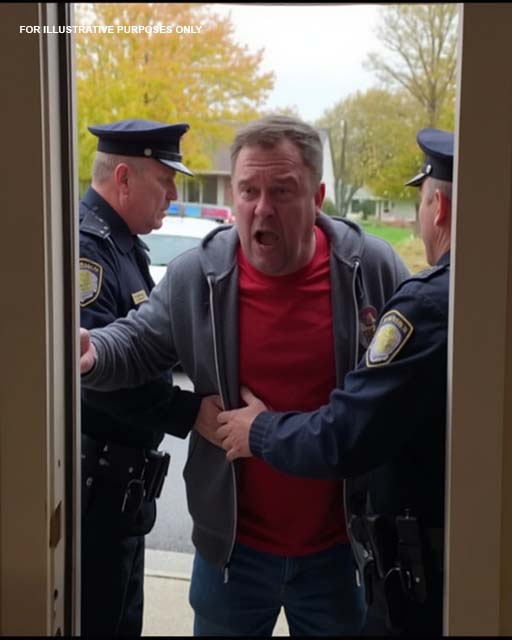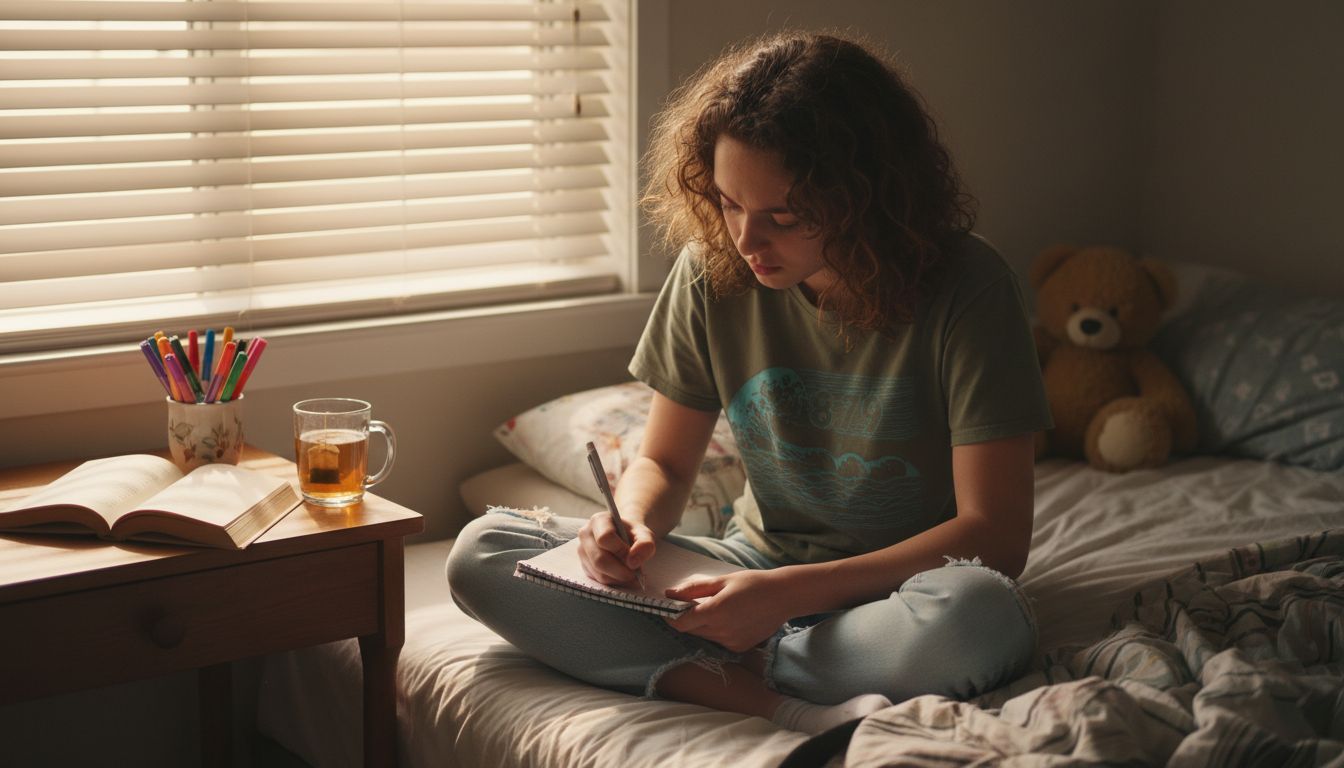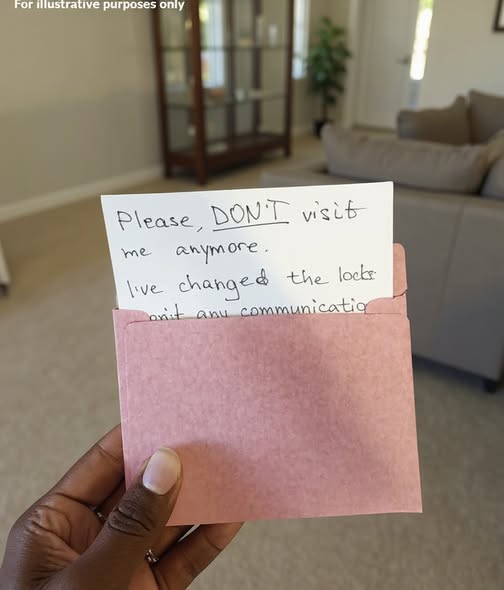
I Helped a Blind Elderly Woman Get Home — The Next Day, Her Sons Arrived at My Door with the Police
It started as an ordinary morning, a quiet, gray day that I’d planned to spend alone. I had gone to the cemetery to visit my father’s grave, something I did every year on the anniversary of his passing. The air was crisp, the grass damp from last night’s rain, and the sound of distant church bells filled the silence.
After spending a few quiet moments by the headstone, whispering things I wished I could still tell him, I turned to leave. That was when I noticed her, a frail woman standing near the gate, clutching a white cane. Her hair was silver, neatly pinned back, and her expression was one of confusion.
“Excuse me,” she called softly. “Could you please help me? I’m afraid I’ve lost my way.”
I hurried over. “Of course. Are you all right?”
She tilted her head toward my voice. “I was visiting my husband’s grave, but I must’ve turned the wrong way. My sons usually come with me, but today I wanted to come alone.”
“Do you live nearby?” I asked gently.
“Yes, just a few streets over,” she said. “Would you mind walking me home? My eyesight isn’t what it used to be, and the roads around here are uneven.”
I hesitated for a moment. I had errands to run and work waiting at home, but something about her reminded me of my grandmother. Her voice carried the same warmth, the same politeness that made it impossible to say no.
“Of course,” I said. “Take my arm.”
Her name was Margaret. As we walked, she told me stories about her late husband, how he’d loved tending to his garden and singing old war songs in the evenings. She spoke with such fondness that I found myself smiling the entire way.
“You have a kind voice,” she said after a while. “You remind me of my daughter-in-law. She’s always busy, poor thing, but she means well.”
When we reached her house, I realized it was a lovely old cottage on a quiet street, surrounded by rose bushes that were still blooming despite the season.
“Would you like to come in for a cup of tea?” she asked. “It’s the least I can do to thank you.”
I hesitated again, but she looked so hopeful that I nodded. “All right, just for a bit.”
Inside, the house was cozy and smelled faintly of lavender and lemon polish. Family photos lined the walls of her room with a smiling husband, two grown sons, and what looked like grandchildren.
Margaret moved around the kitchen slowly but confidently. “I know my way here by heart,” she said proudly, placing the kettle on the stove.
We sat at the table with two cups of tea and a plate of butter biscuits. She asked about my life, my work, and my parents. I told her about my father, how I had just visited his grave that morning. Her expression softened.
“He must’ve been a good man,” she said. “You have his kindness.”
Her words touched me. When it was time to leave, she insisted on walking me to the door herself, one hand on her cane, the other brushing against the wall for guidance.
“Thank you, dear,” she said as I stepped outside. “You’ve been such a blessing today. If you ever need anything, come by or call. My sons don’t visit as much as they used to.”
I smiled. “It was my pleasure. You take care of yourself, all right?”
She nodded. “Always do.”
I left feeling lighthearted, unaware that by the next morning, that same house would be the reason the police came knocking on my door.
The sound of banging startled me awake the next day. It was early, barely 7 a.m., and for a moment, I thought it was a dream. But the pounding continued, followed by shouting.
“Open up! We need to talk to you!”
I stumbled to the door, still in my pajamas, and opened it a crack. Two men stood there, one in his thirties, broad-shouldered and angry, the other younger but just as tense. Behind them stood a police officer.
The older man pointed at me, his face flushed. “THAT’S HER! SHE WAS WITH OUR MOTHER YESTERDAY! SHE WAS IN OUR HOUSE!”
My stomach dropped.
The officer stepped forward calmly. “Good morning, ma’am. Are you Ms. Harper?”
“Yes,” I said slowly, still trying to process what was happening.
“Did you, by any chance, spend time with an elderly blind woman yesterday? Her name is Margaret Lang?”
“Yes,” I said quickly. “She asked me to walk her home from the cemetery. Is she all right?”
The older man let out a bitter laugh. “All right? She’s in the hospital! You tell us what you did to her!”
I blinked in confusion. “What? What are you talking about? I helped her home, we had tea, and then I left. She was fine!”
The younger man stepped closer, his voice shaking. “You were the last person seen with her. When we came by last night, she was unconscious, collapsed on the floor. And some of her jewelry is missing.”
“What?” I gasped. “No! I didn’t take anything! I didn’t hurt her, I swear!”
The officer raised his hand. “Please, everyone, calm down. Ma’am, I’m going to need you to come with us to the station. We just need to ask you a few questions.”
I felt my knees weaken. “But I didn’t do anything wrong!”
“Then you have nothing to worry about,” he said, his tone even.
The neighbors were already peeking through their curtains as I was escorted to the police car. My hands trembled as I climbed in.
At the station, they questioned me for hours. Where had I met Margaret? What time did I leave her house? Did she give me anything? Did I take anything?
I told them everything about the walk, the tea, the stories, how gentle and kind she’d been.
“Did you notice if anyone else came by the house?” the detective asked.
“No,” I said. “It was just us. She said her sons didn’t visit often.”
He scribbled notes. “And what time did you leave?”
“Around two, I think.”
The detective nodded, then looked up from his papers. “Her neighbor said she saw you leave around that time. And the sons claim they came by around six and found her unconscious.”
I swallowed hard. “Was she… did she say anything before she—”
“She’s awake now,” the detective said. “Stable, but still weak. We’ll need to confirm some details with her once she’s ready.”
I exhaled shakily. “Please do. She’ll tell you I didn’t do anything.”
They finally let me go home, though the weight of suspicion hung over me like a storm cloud. I couldn’t eat, couldn’t sleep. All I could think about was Margaret hoping she was truly all right.
The next afternoon, my phone rang. It was the police.
“Ms. Harper,” the detective said, “we’d like you to come in. Mrs. Lang is awake and asked to see you.”
My heart raced. I drove straight to the hospital, my palms slick with sweat. When I entered the room, the two sons were there, glaring at me from opposite sides of the bed. Margaret looked frail but conscious, her eyes hidden behind dark glasses.
The detective spoke first. “Mrs. Lang, this is the woman who helped you yesterday. Do you recognize her?”
Margaret turned her head toward my voice and smiled faintly. “Of course. She’s the kind young woman who walked me home. What’s all this fuss about?”
“Mrs. Lang,” one of her sons began, “your jewelry was missing. The pearl necklace and your wedding ring—”
“Oh, that,” Margaret interrupted with a small chuckle. “I put them away myself. In the cookie tin, in the pantry. I didn’t want to wear them to the cemetery in case I dropped them.”
The room fell silent. The detective blinked. “You… put them away yourself?”
“Yes,” she said patiently. “And then I tripped on the rug after my guest left. I must’ve fainted. When I woke up, I was here.”
Both sons turned crimson, exchanging horrified glances.
Margaret sighed softly. “My sons worry too much,” she said. “They think everyone’s out to hurt me.” She reached out a trembling hand toward me. “I’m so sorry, dear. I never meant for this to happen to you.”
I stepped closer and took her hand gently. “It’s all right, Margaret. I’m just glad you’re okay.”
Tears filled her eyes. “You were the only one kind enough to help me that day. I won’t forget it.”
Outside the hospital, the detective apologized for the misunderstanding. “Her sons were frantic,” he said. “We had to investigate.”
I nodded, still shaken. “I understand. But it was awful being treated like a criminal.”
The two brothers approached me awkwardly. The older one cleared his throat. “We’re… sorry,” he muttered. “We thought—well, we thought you’d taken advantage of her.”
“I get it,” I said quietly. “You were scared.”
He nodded, looking down. “We’ll make it up to you somehow.”
I shook my head. “Just take better care of your mother. That’s all she really wants.”
They both nodded, guilt written all over their faces.
A few weeks later, I received a handwritten letter. The return address was Margaret’s.
My dear,
I can’t thank you enough for your kindness that day. I told my sons you were the reason I made it home safely, and they’ve promised to visit me more often. I hope you’ll come for tea again—this time without the police involved!
With love,
Margaret
I smiled as I folded the letter. Sometimes, I thought, doing the right thing doesn’t always bring immediate peace—but in the end, truth finds its way through.
That day, all I did was help a lonely, blind woman get home. Yet it reminded me of something my father once said: “Kindness isn’t about what you get in return. It’s about doing good, even when the world misunderstands you.”
And as I tucked Margaret’s letter into my drawer, I knew he’d have been proud.




